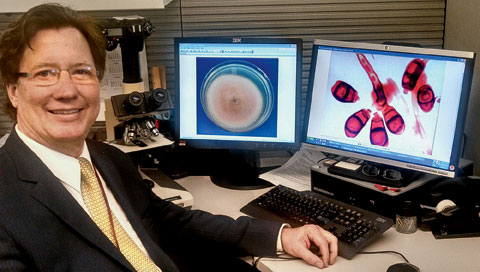January 2022—It’s not curriculum. It’s visibility. That’s the upshot of two companion studies on what influences U.S. medical students to choose pathology as a specialty, say Cindy B. McCloskey, MD, chair of the CAP’s Graduate Medical Education Committee, and Melissa R. George, DO, a member of the committee. Their study of allopathic medical students was published in 2020, and their latest study, of osteopathic medical students, has been submitted for publication.
Read More »Cytopathology in focus: Our appeal to program participants—return glass slides
January 2022—A diverse and copious inventory of Pap and nongynecologic glass slides is the backbone of the CAP glass slide educational programs. Each year tens of thousands of cytopathology slides are packaged and mailed to laboratories enrolled in CAP educational glass slide programs throughout the world. Prior to mailing, numerous cytotechnologists and cytopathologists screen these slides and companion web enhancement images to ensure quality and diagnostic accuracy.
Read More »Gastric HER2, hsALK to join monitored PT list
September 2021—Beginning next year, CAP-accredited laboratories that perform HER2 immunohistochemistry in gastroesophageal adenocarcinoma or highly sensitive (hs) ALK in non-small cell lung cancer will be required to enroll in proficiency testing for those analytes.
Read More »Problems, solutions at core of UTI, C. diff modules
April 2021—Urinary tract infections and Clostridioides (Clostridium) difficile testing are the topics of two of the modules released recently in the CAP Test Ordering Program. The Laboratory Workup for Urinary Tract Infections module became available online in January, and C. difficile Testing in October 2020 (www.cap.org/member-resources/test-ordering-program). The program is free to CAP members.
Read More »Practice management network: A new ‘safety zone’ for practice problem-solving
January 2021—A CAP Practice Management Network will be online Feb. 9 for CAP members and their practice staff who want to share problems and best practices and learn from the practice management insights of others. It will be a “no-judgment zone, a safety zone, a neutral territory,” says Brian H. Le, MD, MBA, co-coordinator of the network and vice chair of the CAP Practice Management Committee, developer of the network. “A lot of practices and new-in-practice pathologists encounter a competitive spirit that sometimes doesn’t serve us well,” says Dr. Le, a pathologist based at Novant Health in North Carolina.
Read More »ER, PgR, HER2 expression rates seen in Q-Probes
June 2020—With release of the latest Q-Probes study, titled “Expression Rates in Invasive Breast Carcinoma,” the CAP Quality Practices Committee fills a gap by providing data collected from a diverse set of 21 U.S. laboratories on the average frequency of various ER, PgR, and HER2 expression results.
Read More »Cytopathology in focus: Gynecologic cytology PT appeals: where they started,where they stand
May 2020—The CAP implemented proficiency testing for cervical cytology in 2006 as mandated by federal legislation. The performance of participants and granting of appeals on glass slides in the first year of the CAP Pap PT program was reported in detail by Crothers, et al. Once a participant initiates an appeal, the slide in question is pulled from the program for a blinded review by three board-certified anatomic pathologists who are members of the CAP Cytopathology Committee. In the first year, 155 participants failed the PT examination and appealed their testing results on 86 individual slides. After review, appeals were granted for 21 slides, resulting in 45 exam failure reversals. The overall appeal rate was 13/1,000 slides in the program.
Read More »Cytopathology in focus: Can you send us your cytology slides? Labs are reimbursed for slides accepted into programs
May 2020—The CAP relies on the generous submission of slide-based cases from laboratories to maintain the excellent quality of its Cytopathology Educational Programs in Gynecologic Cytopathology (Pap Education), Non-Gynecologic Cytopathology (NGC), Fine Needle Aspiration Cytopathology (FNA), and Proficiency Testing Program in Gynecologic Cytopathology (Pap PT). The CAP Cytopathology Committee, composed of 26 pathologists, two junior members, and two cytotechnologist members, meets quarterly and members submit glass slides to these varied programs.
Read More »Newsbytes
August 2019—From concept to curriculum: PIER going strong five years later: In the five years since its launch, Pathology Informatics Essentials for Residents, or PIER, has continued to serve as a much-needed guide for pathology residents and program directors who otherwise would be navigating the waters of informatics training without a compass.
Read More »Program zeroes in on histology, digital scan connection
December 2018—Quality in histology is at the heart of successful whole slide imaging, and a new program that rolls out in January will provide laboratories the aid they may need as they bring whole slide imaging on board.
Read More »Smart test ordering—new program provides the tools
February 2018—A new CAP program with a novel approach makes it easier to take on an old problem: misapplied laboratory tests. The CAP Test Ordering Program, available now and complimentary to all members, is different from other laboratory test utilization initiatives, says Richard W. Brown, MD, medical director for system laboratory services at Memorial Hermann Health System in Houston.
Read More »For Quality Registry, details and demos at CAP17
September 2017—The CAP is set to launch next month the Pathologists Quality Registry for pathologists to begin using in 2018 to collect data under Medicare’s Quality Payment Program (QPP) Merit-based Incentive Payment System (MIPS) track.
Read More »Dashboard eases performance analysis and prep
March 2017—Crystal Sands, MBA, MT(ASCP)SM, manager of quality, regulatory, and safety at NorDx Laboratories in Scarborough, Me., has a new favorite product, and she’s not shy about saying so. “Oh my gosh, I’ll be playing with it for a long time,” she says. “Every time I use it, I find different ways to slice and dice.”
Read More »Cytopathology in Focus: Glass slide programs to have latest terms, ancillary clues
August 2016—Why is there more than one correct answer for this glass slide case? I wouldn’t make the diagnosis of mesothelioma without correlating with the clinical history and performing ancillary studies. In our practice, we would call this case a follicular lesion of undetermined significance, and that isn’t an answer on the response sheet.
Read More »3 new NGS Surveys on CAP 2016 PT launchpad
November 2015—More than two years ago, when the CAP decided to move forward with proficiency testing for next-generation sequencing, the decision point was modest. “We estimated that about 35 labs would subscribe, based on survey information, and that was sufficient for us to move forward,” says Karl V. Voelkerding, MD, chair of the CAP Next-Generation Sequencing project team.
Read More »What’s new in next-gen sequencing checklist requirements
August 2015—The first CAP accreditation checklist requirements specific to next-generation sequencing were published only three years ago. “In 2012, those 18 accreditation requirements were basically all new language that the College’s Next-Generation Sequencing Project Team developed and submitted for review,” says project team chair Karl Voelkerding, MD, of the University of Utah Department of Pathology and ARUP Laboratories.
Read More »Evidence drives guideline on reducing interpretive error
July 2015—Secondary review of surgical pathology cases is a common, if not universal, practice in U.S. anatomic pathology departments. The evidence has shown that case reviews detect errors. But until now, one important thing has been missing: consensus on the actual standard of practice for such reviews. Anatomic pathology departments have lacked evidence-based guidelines on how and when to conduct reviews.
Read More »Visuals to the fore in new histology labeling guideline
June 2015—Like laboratorians, filmmakers split their workflow into three phases. In film, they are pre-production, production, and post-production. When flubs occur on a movie set, “We’ll fix it in post,” often said sardonically, is the fallback game plan to keep things on schedule and use visual and sound effects to cover up mistakes.
Read More »Upper-echelon QA through Accuracy-Based Programs
June 2015—HbA1c, creatinine, testosterone, vitamin D, lipids, and maybe albumin. If you know what the common thread is among these analytes, then you may be familiar with the CAP’s Accuracy-Based Programs and their evolution over the past couple of decades.
Read More »How satisfied are physicians with labs? Study digs deep
March 2015—In the span of human history, seven years is nothing but an eye blink. But in technological terms, seven years might as well be a geologic epoch. Consider: Only since 2007 have we seen Netflix streaming services; Kindles, Nooks, and other e-readers; and the sweeping adoption of the iPhone.
Read More »Pap test litigation—
Not backing off: CAP retains call for blinded review
March 2015—When the 11th Circuit U.S. Court of Appeals issued an opinion harshly criticizing the CAP’s guidelines on review of Pap tests last summer, many in the pathology community were stunned by the rebuke and wondered whether change was called for.
Read More »Is molecular AP testing in sync with guidelines?
November 2014—Molecular testing, on a steep growth curve in anatomic pathology, is increasingly providing decisive guidance for treatment of cancer patients. But while guidelines on clinical relevance and performance of common molecular tests are available and widely used in theory, to date there has been limited information on how well requests for molecular testing in AP laboratories are adhering to the guidelines.
Read More »New programs next year in gyn, nongyn cytopathology
November 2013—Participants in the CAP cytopathology programs will have new modules to select and new cases to learn from in 2014. Samples of static images that accompany the Touch Imprint/Crush Prep cases. In gynecologic cytopathology, a new L module for education will feature liquid-based SurePath and ThinPrep slide methods only. These will be designated PAPL/APAPL, with a choice of series one or two.
Read More »Yeast, molds, and cell types in 2 benchtop guides
April 2013—During his six years overseeing fungal proficiency testing and assembling a library of fungal images on behalf of the CAP’s Microbiology Resource Committee, Gordon L. Love, MD, D(ABMM), noticed some-thing: Molds are surprisingly lovely.
Read More »Order more tests? With diabetes, answer may be ‘yes’
March 2013—In patients with diabetes mellitus, hemoglobin A1c testing frequency is largely in line with recommended guidelines. In those same patients, LDL testing is not performed frequently enough, and urine protein testing frequency falls far short of recommendations.
Read More » CAP TODAY Pathology/Laboratory Medicine/Laboratory Management
CAP TODAY Pathology/Laboratory Medicine/Laboratory Management











